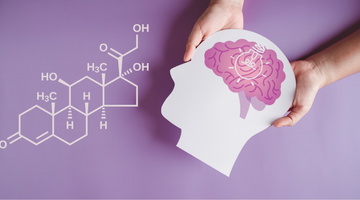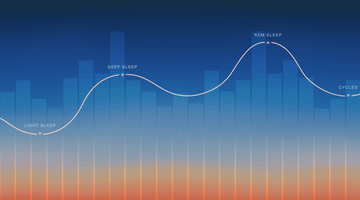You don’t need to be a rocket scientist to know that sleep is good for you. After a great night’s sleep, you have more energy (obviously!), your brain functions better, you make better food choices… and your day just seems to run much more smoothly! Let's just say a healthy sleep is fundamentally crucial to our overall health and well being.
Coincidently, sleep is so often overlooked by athletes and gym-goers as a critical factor to becoming a pro fat burner and maximizing muscle gains.
Imagine, if you could just sleep better you could significantly improve your chances of reaching your goals and having the body you've always wanted - who doesn’t love the thought of that! Let's look at this a bit more.
sleep and fat loss
Will I burn more fat if I sleep better? The short answer is Yes! Essentially, when you’re calorie-cutting, even short term sleep deprivation appears to hinder fat loss attempts by reducing the percentage of weight loss that is fat mass.
A study found that during a 2-week period of caloric restriction (in which slightly overweight subjects lost 3kg of body weight), the proportion of weight lost as fat was substantially affected by sleep duration. When sleeping normally, the proportion of weight lost as fat was approximately 50%. When sleeping for 5.5 hours each night, the proportion of weight lost as fat was 25%. [1]
Why is this? Excuse the technical jargon but essentially, glucose metabolism (sugar processing) starts to increase in the second half of the night when you enter REM sleep. The longer you sleep, the more REM sleep you get.
The bottom line here is that during periods of caloric restriction, it is important to maximize the proportion of weight lost as fat and minimize the proportion of weight lost as muscle. So good sleep quantity and quality need to be a priority.
sleep and muscle gains
It may be no surprise to you that sleep helps muscles grow. However, you may not know that without adequate sleep muscle mass actually decreases.
A study in 2011 examined how sleep deprivation affected muscle gains and recovery. The study followed individuals who were on a strict sleep schedule for 72 hours. During this time, one group was allowed 5.5 hours of sleep; another was allowed 8.5 hours per day. All individuals followed the same calorie-regulated diet.
What researchers discovered was that at the end of the study, the individuals who slept only 5.5 hours had 60% less muscle mass, while individuals who slept 8.5 hours had 40% more muscle mass. [2]
Why? Well is mainly to do with hormones again, specifically anabolic and catabolic hormones, which are strongly influenced by sleep. Experts' estimate that as much as 75% of human growth hormone is released during sleep. And it’s this growth hormone that stimulates growth in muscles and helps maintain cells, tissues and organs throughout life. Human growth hormones need to be present to actually use the amino acids present. You’ve probably guessed it, without a good quantity and quality of sleep, the body simply cannot do these things well.
Related: Sleep by Chris Beardsley of Strength and Conditioning Research
other reasons to focus on your sleep
During sleep, your body actively recovers, restores and heals. It performs numerous vital processes that help you perform better mentally, physically and it can certainly make you a lot happier! Getting enough quality sleep has to be a priority with anyone with health and fitness goals. So if lack of sleep’ impact on fat loss and building muscle isn't enough of a reason to make it a focus, here are a few more:
- Better hunger management - when you’re not sleeping, your hunger hormones (ghrelin and leptin) get all out of whack. Ghrelin is your ‘i’m hungry’ hormone and sends signals to your brain when it’s time to eat. Your body produces more ghrelin when you are sleep deprived, which means you feel hungry more often. Leptin is your ‘i’m full’ hormone (satiating) and lets your body know that you’re full. Just two nights of poor sleep can see Leptin drop by 18% and Ghrelin rise by 28%. A better night’s sleep will have these hormones returning to normal and you will likely eat less. [3]
- Reduced risk of insulin resistance - this is where your body struggles to process insulin (the hormone responsible for changing sugar and starches from your blood into energy). There are numerous studies that link lack of sleep to insulin resistance, and when insulin resistance occurs, you are going to store fat. In one study, healthy young men who were sleep-deprived (5 hours a night) for 7 nights, raised concerns about some of the chronic diseases related to insulation resistance like pre-diabetes. The good news is that an insulin-resistant state can be reversed by a period of increased sleep. [4]
- Reduced risk of ‘chronic’ inflammation - the useful type of ‘acute inflammation’ is the body's way of signalling the immune system to heal and repair damaged tissue, as well as defend itself against foreign invaders, such as viruses and bacteria. The not so useful type is ‘chronic inflammation’ which is a steady, low-level of inflammation throughout the body, as judged by a small rise in immune system markers found in blood or tissue. Chronic inflammation can contribute to the development of disease and all kinds of poor health outcomes. Recently several studies have linked inflammation to diabetes, poor digestion/nutrient uptake and obesity.[2] In fact, some experts are calling obesity an inflammatory disease.
- Improved focus - when you don’t sleep you just can’t think straight! Ever noticed that when you have a poor night's sleep you make bad decisions, are generally more irritable and far less focussed. Motivation is often at an all-time low and your willpower is depleted. You are more likely to stray when you’re trying to stick to your healthy nutrition programme. And whilst you may muster the energy (with the help of caffeine) to exercise, the benefits aren’t as great because the focus isn’t there either. [6]
- Reduced cortisol/stress levels - cortisol is your body's built-in alarm system, also referred to as the stress hormone. It’s essential for life and works with certain parts of your brain to control your mood, motivation and fear. According to recent research, not getting enough sleep can raise cortisol levels in the afternoon and evening. When your cortisol levels are high, firstly your body stores fat and secondly it can cause chaos with your sleep patterns, making sleep difficult. The key takeaway here is when your hormones are balanced, and working for you it’s a wonderful thing. However, when they are out of balance you may feel and look your worst. [7]
tips for a proper night's sleep
Better sleep is multifactorial and comes as a result of good sleep planning hygiene. Here’s our top tips for working towards the best night’s sleep you’ve ever had. Again there is no magic bullet and it may take playing around with a few ideas to see what works for you - happy experimenting!
1. Calculate your optimal length of sleep
It goes without saying, everybody is different. But the National Sleep Foundation recommends that most adults should get 7 - 9 hours a night. Are you productive, healthy and happy on seven hours of sleep? Or does it take you nine hours of quality ZZZs to get you into high gear? [8]
Work out how much sleep should you get, by using the following sleep calculator:
- The average sleep cycle is 90 minutes long.
- A typical night of sleep includes 5 or 6 full sleep cycles. So choose your target either:
- 7.5 hours (90 x 5 = 450 minutes) or
- 9 hours (90 x 6 = 540 minutes)
- Starting at your desired wake time, work back 7 or 9 hours to find your sleep start.
- Allow 20-30 mins to fall asleep.
For example, You need to wake at 6 a.m. to get ready for work. Counting back 7.5 hours plus 30mins, your ideal bedtime is 10:00 p.m. That means lights out, in bed, ready for sleep at that time. Your ideal goal is to be waking up 5-10 minutes before your alarm, so play around with the start time stick with the same routine.
2. Ensure your bedtime is between 8 pm and 12 am
So if you're getting the recommended 7-9 hours of sleep, why should it matter when you go to bed? Essentially, again due to our individual internal clocks (circadian rhythms), the amount of deep sleep gets less as the night wears on. When it comes to bedtime, there’s a window of several hours—roughly between 8 pm and 12 am —during which your brain and body have the opportunity to get most of the deep restorative shuteye needed to function optimally. The later you leave it the potentially less deep restorative sleep you may get. [9] The best time for you, though, will vary depending on your sleep genetics hence some people are “early birds” and “night owls”.
So if you tend to be a little groggy headed in the mornings consider experimenting with an earlier bedtime and then get your optimal hours shut-eye. Your body will thank you for it. Plus getting up earlier may help you squeeze in a killer 30 min gym session too.
3. Reframe how you think about sleep
Have you ever felt like you have no time to rest? This sort of mindset can be a self-fulfilling prophecy. If you constantly tell yourself you don’t have any time for relaxing or sleep, pretty soon you’ll believe it one hundred per cent.
How you view rest (whether positive, negative, dismissively, or with anxiety) can significantly affect your quality of sleep. Learn to see sleep in a new light by reminding yourself of the immense value healthy habits bring to our lives.
What are your core priorities? Is there a fitness goal you are trying to achieve, do you want to be more present for your family, or do you want to simply stay healthy? Keep this awareness in mind as you begin rewiring your mind and improving your sleep habits.
When you feel like there is too much to do in your day to make time for rest or you are struggling to put your iPad down late at night, remind yourself of the reasons why you want to sleep better.
4. Create some new sleep habits
Set the scene, make your room dark, cool & quiet.
- Avoid/reduce all types of light because darkness signals your body to produce melatonin, the key hormone that signals your body that it’s time to sleep. Blue light — which is produced by the sun but also by the screens of TV sets, computers, and smartphones — disrupts your production of melatonin. For that reason, it is important that you avoid lights during the 1 hour or so before bedtime. Also know that even once you’ve reached the land of nod, lights can still impair the quality of your sleep even if they don’t wake you. [10] If you live in an area where light pollution is a concern, perhaps use a sleep mask or blackout curtains to reduce your light exposure. Ideally, switch off blue light devices an hour before shut-eye. Or if you must use a phone before bed consider using an app to reduce blue light emissions or get some blue-light-blocking glasses.
- Limit the possibility of distracting sounds. Unsurprisingly noise can drastically reduce the quality of your sleep, this includes sounds that don’t wake you up which can still impair the quality of your sleep. [11] If you can’t make your bedroom silent, use earplugs (unless you need to hear your baby calling). Some people appreciate white noise or soothing music, especially when it masks more irritating sounds, such as traffic noise; but keep the volume low.
- Keep your bedroom cool, because you'll sleep better in a cool place. A ‘comfortably’ cool room can reduce the time it takes you to fall asleep and enter the deeper stages of sleep. If the room is too hot, it can delay sleep onset and reduce sleep quality. [12]
Get some early day sunshine.
Interaction with natural light causes your body to produce melatonin, which is critical in regulating your sleep cycles. Vitamin D comes from sunshine and helps your body naturally produce its own melatonin, making a supplement unnecessary. If you can’t get out in the sun or are still struggling to sleep, only then you might consider adding in a Vitamin D or melatonin as a supplement. [13]
Don’t exercise too late in the day.
Sleep better, exercise more. Exercise more, sleep better. Physical exercise during the day leads to better sleep at night. Although nightly exercise is better than no exercise, it can disrupt the circadian rhythm of some people. [14] Everyone is different though, so if you discover that exercising too close to bedtime disrupts your sleep, try finding another workout window.
Maintain a regular sleep schedule and go to bed earlier.
Going to bed at around the same time every night can help you to both fall asleep faster and sleep better. A bedtime routine can prime your body for sleep; your routine should be more soothing (e.g. reading, relaxing to music) than stimulating (e.g. playing a computer game, watching a horror movie). [15]
Leave time to relax before bed, make time for sleep.
Among the many possible causes for lack of sleep, two of the most common in our modern world are stress and the simple fact that many people don’t schedule enough time for sleep on a daily basis, instead of hoping to “catch up” during the weekend (a strategy with very limited success).
Make time for sleep! Make a habit of relaxing beforehand, enjoy a bath, reading. Lavender oil is a great stress reliever. [16]
5. Eat and drink to sleep
Stay hydrated.
Going to bed even mildly dehydrated can disrupt your sleep. Dehydration causes your mouth and nasal passages to become dry, setting you up for sleep-disruptive snoring and a parched throat in the morning. Likewise, a lack of sleep has also been associated with being more dehydrated. A lack of pre-bed fluids can also lead to nocturnal leg cramps that may keep you awake. In addition to the frustration of fragmented sleep, being dehydrated during the night can compromise your alertness, energy, and cognitive performance the following day. [17]
Focus on drinking plenty of non-caffeinated fluids regularly throughout the day. Women need approximately 2.5 litres daily from beverages and foods, while men should aim for about 3.5 litres. Perhaps focus on getting the majority of your daily water in the first half of your day and avoid waiting until bedtime to do your drinking as this sets you up for nighttime bathroom trips.
Beware of hidden sleep stealers, like alcohol and caffeine.
- Avoid alcohol after dinner. Alcohol can sometimes seem like a sleep aid — it might help you relax, but it will reduce the quality of your sleep. You may find it beneficial to avoid alcohol after dinner. [18]
- Limit caffeine after 4 pm. Even if it doesn’t prevent you from falling asleep (which it can even do for some hardened coffee and tea drinkers), caffeine can still reduce the quality of your sleep so try and avoid it within the six hours before bedtime. [19]
- Check any supplements you take for caffeine too. Caffeinated pre-workouts have great benefits when it comes to fat burning and power output but can affect your sleep if taken in the late afternoon/evening.
Tried all of the above?
If you’ve taken some of all of the steps described above yet still have trouble falling asleep, you could try.
- Increase in magnesium use. Lack of magnesium can affect sleep. Since magnesium is lost through sweat, magnesium deficiency is something athletes should be aware of. [20] Multiple types of magnesium supplements exist, but magnesium-rich foods are numerous and can fit all kinds of diets: they should be your first option. If your body has enough magnesium already, supplementing with more won’t benefit your sleep. You can read more on supplementing with magnesium here.
- Take Vitamin D (in the morning) - Vitamin D helps your body naturally produce its own melatonin. Some people refer to it as the ‘sunshine’ supplement. But if you can’t get out in the sun, or are still struggling to sleep, then you might consider adding in a supplement. Many people use a melatonin supplement, but another option is to look at Vitamin D, as it's one of the most important supplements to consider taking as its benefits go far beyond sleep. [21] You can read more on supplementing with Vitamin D here.
- Supplement with melatonin. Oral melatonin may help alleviate insomnia, reduce sleep latency, and improve sleep quality. Don’t be fooled into thinking that oral melatonin will allow you to shift your sleeping schedule at will, regardless of where you live. When all is said and done, light is still a stronger regulator of your body’s melatonin rhythm (the circadian rhythm of your body’s production of melatonin). The good news is that, according to studies lasting between one week and one month, supplementing melatonin doesn’t seem to affect your own production. [22]
Key takeaways
Whilst we all know that sleep is important; the extent to which may have surprised you.
“There is not one process in the human body, (that we’re aware of) that isn’t improved by sleep”
Once you can grasp how improving how you sleep can positively your life, health and fitness goal it can be real game-changer.
We hope that you've found the article useful. If you have a question or query on the above article or want some help pointing in the correct direction, send an email to the team at info@drinkamino.com and we will do our best to help you out.
References
[1] Short term sleep deprivation appears to hinder fat loss attempts via reducing the percentage of weight loss that is fat mass.
- Nedeltcheva AV, et al. Insufficient sleep undermines dietary efforts to reduce adiposity. Ann Intern Med. (2010)
[2] Sleep deprivation can cause muscle loss.
- Dattilo M, Antunes HK, Medeiros A, et al. Sleep and muscle recovery: endocrinological and molecular basis for a new and promising hypothesis. Med Hypotheses. (2011)
[3] Sleep deprivation appears to increase hunger.
- Benedict C, et al. Acute Sleep Deprivation Enhances the Brain's Response to Hedonic Food Stimuli: An fMRI Study. J Clin Endocrinol Metab. (2012)
- St-Onge MP, et al. Sleep restriction leads to increased activation of brain regions sensitive to food stimuli. Am J Clin Nutr. (2012)
[4] Both shortened, as well as excessive sleep, are associated with insulin resistance and an increased risk of diabetes. Significantly reduced sleep time for a single day (4 hours of sleep) also confirm insulin resistance in otherwise healthy persons.
- Bosy-Westphal A, et al. Influence of partial sleep deprivation on energy balance and insulin sensitivity in healthy women. Obes Facts. (2008)
- Broussard JL, et al. Impaired insulin signalling in human adipocytes after experimental sleep restriction: a randomized, crossover study. Ann Intern Med. (2012)
- Buxton OM, et al. Sleep restriction for 1 week reduces insulin sensitivity in healthy men. Diabetes. (2010)
- Donga E, et al. A single night of partial sleep deprivation induces insulin resistance in multiple metabolic pathways in healthy subjects. J Clin Endocrinol Metab. (2010)
[5] Prolonged sleep restriction increases the risk of chronic inflammation.
- Haack M, Sanchez E, Mullington JM. Elevated inflammatory markers in response to prolonged sleep restriction are associated with increased pain experience in healthy volunteers. Sleep. (2007)
- Alhola P, Polo-Kantola P. Sleep deprivation: Impact on cognitive performance. Neuropsychiatr Dis Treat. (2007)
[7] Sleep loss elevated cortisol levels and deregulates the normal rhythm of cortisol
- Leproult R, Copinschi G, Buxton O, Van Cauter E. Sleep loss results in an elevation of cortisol levels the next evening. Sleep. 1997
[8] https://www.sleepfoundation.org/articles/how-much-sleep-do-we-really-need
[9] Matthew Walker (Author) - Why We Sleep: Unlocking the Power of Sleep and Dreams Paperback – 19 Jun. 2018
[10] Light levels impact the quality of your sleep.
- Tosini G, Ferguson I, Tsubota K. Effects of blue light on the circadian system and eye physiology. Mol Vis. (2016)
- Bedrosian TA, Nelson RJ. Timing of light exposure affects mood and brain circuits. Transl Psychiatry. (2017)
- Heo JY, et al. Effects of smartphone use with and without blue light at night in healthy adults: A randomized, double-blind, cross-over, placebo-controlled comparison. J Psychiatr Res. (2017)
- Esaki Y, et al. Wearing blue light-blocking glasses in the evening advances circadian rhythms in the patients with delayed sleep phase disorder: An open-label trial. Chronobiol Int. (2016)
- Skeldon AC, Phillips AJ, Dijk DJ. The effects of self-selected light-dark cycles and social constraints on human sleep and circadian timing: a modeling approach. Sci Rep. (2017)
[11] Noise levels impact the quality of your sleep.
- Basner M, et al. ICBEN review of research on the biological effects of noise 2011-2014. Noise Health. (2015)
- Halperin D. Environmental noise and sleep disturbances: A threat to health?. Sleep Sci. (2014)
- Hume KI, Brink M, Basner M. Effects of environmental noise on sleep. Noise Health. (2012)
- Portas CM, et al. Auditory processing across the sleep-wake cycle: simultaneous EEG and fMRI monitoring in humans. Neuron. (2000)
[12] Core body temperature impacts the quality of your sleep.
- Lack LC, et al. The relationship between insomnia and body temperatures. Sleep Med Rev. (2008)
- Okamoto-Mizuno K, Mizuno K. Effects of thermal environment on sleep and circadian rhythm. J Physiol Anthropol. (2012)
- Okamoto-Mizuno K, et al. Effects of humid heat exposure on human sleep stages and body temperature. Sleep. (1999)
- Murphy PJ, Campbell SS. Nighttime drop in body temperature: a physiological trigger for sleep onset?. Sleep. (1997)
- Libert JP, et al. Relative and combined effects of heat and noise exposure on sleep in humans. Sleep. (1991)
[13] Sunshine and light regulate our internal body clocks.
- Brown, G M. Light, melatonin and the sleep-wake cycle.Journal of psychiatry & neuroscience : JPN vol. 19,5 (1994): 345-53.
[14] Exercise not too late in the day
- Murray K, et al. The relations between sleep, time of physical activity, and time outdoors among adult women. PLoS One. (2017)
- Tahara Y, Aoyama S, Shibata S. The mammalian circadian clock and its entrainment by stress and exercise. J Physiol Sci. (2017)
- 2013 Sleep in America® Poll: Exercise and Sleep (summary of findings), “Exercise is good, regardless of time of day” (pages 46–49).
[15] Sleep schedule
- Phillips AJK, Clerx WM, O'Brien CS, et al. Irregular sleep/wake patterns are associated with poorer academic performance and delayed circadian and sleep/wake timing. Sci Rep. 2017
[16] Lavender may help sleep quality and alleviate anxiety.
- Lee IS, Lee GJ. Effects of lavender aromatherapy on insomnia and depression in women college students. Taehan Kanho Hakhoe Chi. (2006)
- Lewith GT, Godfrey AD, Prescott P. A single-blinded, randomized pilot study evaluating the aroma of Lavandula augustifolia as a treatment for mild insomnia. J Altern Complement Med. (2005)
- Chien LW, Cheng SL, Liu CF. The effect of lavender aromatherapy on autonomic nervous system in midlife women with insomnia. Evid Based Complement Alternat Med. (2012)
- Goel N, Kim H, Lao RP. An olfactory stimulus modifies nighttime sleep in young men and women. Chronobiol Int. (2005)
[17] Hydration - Sleeping less may increase the risk of dehydration.
- Rosinger AY, Chang AM, Buxton OM, Li J, Wu S, Gao X. Short sleep duration is associated with inadequate hydration: cross-cultural evidence from US and Chinese adults. Sleep. 2019
[18] Alcohol
- Stein MD, Friedmann PD. Disturbed sleep and its relationship to alcohol use. Subst Abus. (2005)
- Park SY, et al. The Effects of Alcohol on Quality of Sleep. Korean J Fam Med. (2015)
- Stone BM. Sleep and low doses of alcohol. Electroencephalogr Clin Neurophysiol. (1980)
[19] Caffeine
- Barry RJ, Clarke AR, Johnstone SJ. Caffeine and opening the eyes have additive effects on resting arousal measures. Clin Neurophysiol. (2011)
- Childs E, de Wit H. Subjective, behavioral, and physiological effects of acute caffeine in light, nondependent caffeine users. Psychopharmacology (Berl). (2006)
- Holtzman SG. CGS 15943, a nonxanthine adenosine receptor antagonist: effects on locomotor activity of nontolerant and caffeine-tolerant rats. Life Sci. (1991)
- Drake C, et al. Caffeine effects on sleep taken 0, 3, or 6 hours before going to bed. J Clin Sleep Med. (2013)
[20] Magnesium
- Nielsen FH, Lukaski HC. Update on the relationship between magnesium and exercise. Magnes Res. (2006)
- Tang YM, et al. Relationships between micronutrient losses in sweat and blood pressure among heat-exposed steelworkers. Ind Health. (2016)
- Institute of Medicine (US) Committee on Military Nutrition Research; Marriott BM, editor. Washington (DC). Nutritional Needs in Hot Environments, “Influence of Exercise and Heat on Magnesium Metabolism”. National Academies Press (US). (1993)
- Consolazio CF, et al. Excretion of sodium, potassium, magnesium and iron in human sweat and the relation of each to balance and requirements. J Nutr. (1963)
[21] Vitamin D - there are observational studies that suggest Vitamin D supplementation may help with better sleep. https://examine.com/nutrition/can-supplemental-vitamind-improve-sleep/
[22] Melatonin
- Ferracioli-Oda E, Qawasmi A, Bloch MH. Meta-analysis: melatonin for the treatment of primary sleep disorders. PLoS One. 2013;8(5):e63773. Published 2013 May 17.






